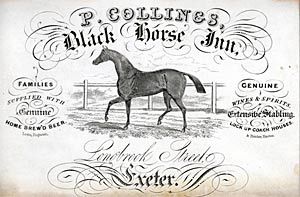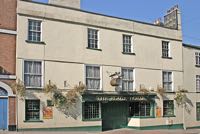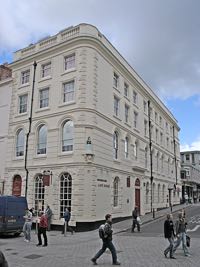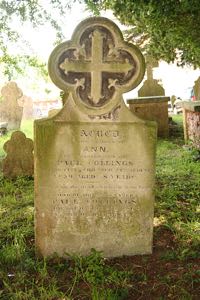
Paul Collings
Born c 1798 Innkeeper and a Waterloo Veteran.
Return to Exeter People Menu
Page updated 8 June 2008
The 19th Century produced some interesting characters in Exeter and Paul Collings is one, who deserves to be remembered in the city. His early history is uncertain - what is known is that he was born in Spain around about 1798. Whether he lost his parents or he was abandoned, is uncertain but, what is known, is that he never knew his birth name or age. A romantic family rumour suggests that he was found in a crib, with a Spanish Royal Family coat of arms and sword, on a battle field. Whatever, the truth, it would appear that the young Paul Collings found himself attached to the 13th Lancers, who were fighting Napoleon's forces in the Peninsula War. The only education Paul Collings received was from the bible and the Lancers. When about 16 years old, as an officer's servant, he walked across the field of Waterloo, the day after the battle.
A family letter suggests that Sir Harry Smith played an important part in bringing the young Spanish lad to England. What is certain is that he ended up in Plymouth without a friend, and for a brief time he worked in the stables of an inn in Ivybridge.
Paul Collings ended up working at the New London Inn as a stable lad and rose to be the inn's coach driver. He was a small man, weighing just eight-stone; once, when driving a carriage in a rain storm with no passengers, a passing horseman noticed that the carriage appeared to have no driver. He chased after, thinking the horses had taken off by themselves. When he reached the coach, Collings' head popped up out of the boot in full control of the horses.
The Black Horse
He eventually left the New London Inn to branch out and take over the Black Horse Inn in Longbrook Street. Collings had married Ann Ireland, the daughter of John Ireland the Innkeeper of the Barnstaple Inn, in 1827.
He was good with horses and horse transport as demonstrated by a large floral jug that could hold "nearly a dozen champagne" in the possession of his descendents. Presented in 1836 it was inscribed with "A token of respect to Mr. Paul Collings for the invention of the self acting drag, by me who has found it, by experience to be of the greatest utility 1836". This was apparently a line and crank braking system for coaches and wagons descending a hill. Ironically and tragically, Collings five year old son was killed outside the Black Horse in 1843, when he was knocked over by a coal cart, while crossing Longbrook Street.
Stage-coach services
He developed several stage-coach services, especially to feed the London train service after 1844. The Neptune to Torquay's Herder's Hotel was advertised in 1846, the Ruby between Barnstaple and Exeter of 1844 and the Chagford Mail of 1857 were all run by Collings, calling at the Black Horse Inn.
In 1850 he announced the Economist omnibus service between Livery Dole and and the Exeter Railway Station (St David's) at a cost of 3d, while his fly-driving service was mentioned in a case in 1850, when one of his drivers was prosecuted for overcharging a customer. It was claimed that the journey, from the station to Colleton Crescent, was less than a mile, so Collings measured the distance, proving it to be a mile and a quarter, and therefore vindicating his driver's charge.
In 1848, Collings witnessed the launch of the first Balloon ascent in Exeter from Exeter Castle followed the course of the balloon with a carriage, reached the landing point, and brought the aeronauts back to Exeter before it became dark.
The Queens Hotel
After 20 years at the Black Horse, in July 1852, he left and took over the Queen's Hotel in Queen Street, and arranged an opening dinner on the 24 November. In the notice of his move to the Queen's Hotel he also advises that he provides "Post Horses and Good Carriages, Funeral Carriages etc. to all parts of the Kingdom". The Black Horse was taken over by his son, also Paul, who ran it until his own death in 1891.
Paul Collings owned many properties in Exeter apart from the Black Horse, and the Queens Hotel. Number 1, Castle Terrace, he leased to a Mr Kilner. In 1861, Collings is listed as the Postmaster, at Castle Terrace, employing ten men and his daughter Sarah Jane. He also owned a property in Paris Street, while his home towards the end of his life was at 3 Bradninch Place.
Paul Collings still maintained an interest in the army, in his later life, and was one of the earliest Rifle Volunteers in the city. When the 13th Lancers were quartered at Higher Barracks, he presented the regiment with some handsome maps in gratitude for the education he had received from them.
In 1856, at Exeter's Peace Celebration for the Crimea War, he drove members of the Celebration committee in a coach and four grey horses, for which he was presented with a gold mounted whip. In 1858, an announcement of his retirement appeared in the Flying Post, and the Queen's Hotel was taken over by his son-in-law, Mr I W West.
Obituary
He died on 27 February 1868 at the age of 70 while living at 34 Paris Street–the writer of an obituary in Trewman's Exeter Flying Post says that he once asked Paul Collings why he had served England at Waterloo when foreign born. His reply...
"I have been nursed and bred in Old England, I have thrived under her institutions, I have been protected by her laws, I served when I was a boy in the Waterloo Campaign, and so long as God gives me strength, if the time comes, I will serve her on her own ground". Such a man deserves to be remembered as a true Exonian.
Paul Collings family continued to be involved with horses. His son Paul, who ran the Black Horse Inn was often mentioned in the Flying Post in the horse racing pages, as an enthusiastic jockey. Another son, J J Collings became a veterinary surgeon, gaining his diploma in London during 1853. His grandson, also Paul, ran the corn and forage side of the business in the New North Road, near the city weighbridge. His great grandson, Joseph, founded the Porlock Vale Riding School while Capt. Tony Collings, Joseph's son trained the Three day event team for Helsinki in 1952 at Porlock Vale Riding School. He was also the instigator of The Horse of the Year show and a winner at Badminton in 1950. Joseph's brother Reginald trained as a vet before running the Exeter Horse Sales, and consequently became associated with Walter Hussey when he was asked to run the Exeter Cattle Market.
Based on the family research of Shirley Collings McBrien and a family letter in the possession of Roger Marshall, and the Badmington Library - Driving 1889.

│ Top of Page │


